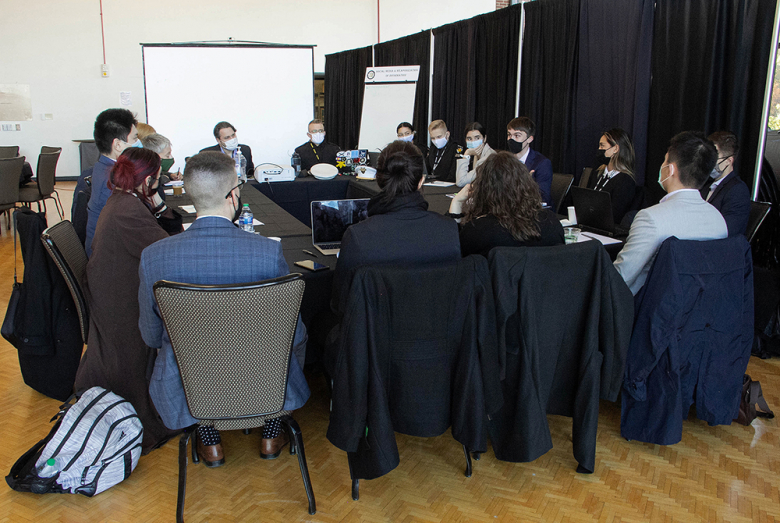Cadets and various students from universities across the nation convened at Eisenhower Hall to attend the annual Student Conference on United States Affairs Nov. 3-6 at the U.S. Military Academy.
Since 1949, West Point has hosted SCUSA, bringing the nation’s top students from Social Science programs to gather here and discuss matters of national importance, with this event marking the 72nd year SCUSA has taken place. Approximately 200 undergraduate students from 125 colleges and universities worldwide attended the event.
During the conference, cadets and students attended panel discussions, received advice from keynote speaker Brig. Gen. Paul Nakasone, the commander of U.S. Cyber Command and director of the National Security Agency, and worked in teams through roundtable discussions to address national issues and develop policy recommendations that focused on essential topics in U.S. foreign policy.
“It’s structured with four days of roundtable sessions. The first round table session is an intro to the topic. Basically, introductions between teammates — getting to know who’s on their team and exactly what they’re going to be creating a policy for. So it’s a lot of background information,” Class of 2023 Cadet Daylan Williams, one of the facilitators of the event, said.
Moreover, West Point facilitates the SCUSA event to develop lasting civil-military relationships among future leaders in the military, government and private sector. In addition, the teams were tasked with developing proposals for different policy problems that focused on multiple issues such as political economy, social media, public health and climate change, among others, Williams added.
“What I gathered from our conversations so far is that it’s really important to analyze these questions both empirically and theoretically, and I feel like the diversity of students here has really allowed us to approach the issues from so many different disciplines and social science lenses,” Michael Zhu said, an undergraduate from Havard School who helped developed policy recommendations to defend against misuse of social media and the weaponization of information from foreign adversaries.
Class of 2021 Cadet Jerome Lavely’s team discussed policy recommendations for 21st century vulnerabilities to the nation’s critical infrastructure, and he felt that the facilitation of the conference allowed for adequate and organized discussions.
“The panel discussion held on Wednesday was very useful in getting everyone, from different backgrounds, on the same page,” Lavely said. “The conversation we’ve had thus far (since SCUSA started) has been very productive in terms of narrowing down the fields of view of each individual who’s lending their voice to the cause. And so, I think we’ve done a good job of identifying potential routes to take to develop the appropriate policy.”
Roundtable sessions lasted four hours, with each day culminating with a West Point event in the evening, which included a walking tour through the historical monuments of West Point and a showcase of West Point clubs, Williams said.
“We have the Combat Weapons team coming out. They’re going to show some of the weapons and equipment they get to work with. I think that’s really a fun event because we get a lot of like ROTC cadets who come here and ask questions about how we do things at West Point. We also have the Pipes and Drums team that will perform a musical number,” Williams said.
During the third session of the event, teams had to have a plan of action for a policy recommendation organized and ready with a solution.
Then, at the fourth and final session, Williams said that each team would meet their deadline and present a concisely written and polished policy recommendation.
“Thinking strategically rather than politically on how to develop the policy recommendation has been huge for us as a team because it allowed us to think about these problems differently than usual because we’re not relying on the same structures our forefathers used,” Zhu said about his experience.
Emma Beach, an undergraduate at George Washington University and a teammate of Zhu, said collaborating with military service members and cadets made the experience dynamic.
“Being introduced to the military component that (civilians) do not typically get to interact with and combining their points of view with the opinions of students from all over the United States definitely helped me see the bigger picture in all of this,” Beach said.
As the event culminated, Class of 2022 Cadet Lillian Brown, the cadet commander for the event, felt she learned valuable lessons while coordinating the event that will assist her when she finally commissions into officership.
“Taking command of assignments like this one has really given me the confidence I needed to succeed as an officer. It made me realize I know a lot more than I think I do,” Brown said. “This experience has uplifted my confidence, and it’s really great to learn and understand what it is like to work on a staff of this magnitude because most officers in the Army spend their time coordinating on this level.”
